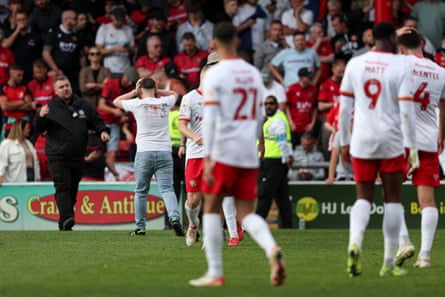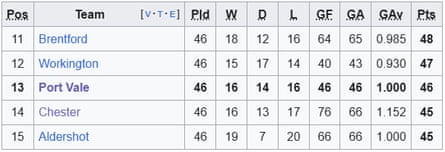“Daniel Farke has won the Championship for the third time,” notes Giacomo. “Who has won the English second tier the most? And are there any second-tier masters around the world?”
Dirk Maas begins by pointing us in the direction of another manager who scooped up three English second-tier titles with two different teams.
“Peter McWilliam won the second division with Tottenham Hotspur in 1919-20 and then guided Middlesbrough to the 1926-27 and 1928-29 titles,” he writes. In fact, there’s a lengthy list of managers who, just like McWilliam and Farke, have won three second-tier league titles in major leagues. Dirk has kindly collated them for us.
• Luigi Simoni: Genoa (1975-76), Pisa (1984-85 and 1986-87)
• Carlos Babington: Banfield (1992-93), Huracán (1989-90 and 1999-00)
• Miguel Ángel Russo: Lanús (1991-92), Estudiantes de la Plata (1994-95), Rosario Central (2012-13)
• Dennis van Wijk: KV Oostende (1997-98), Royal Charleroi (2011-12), KVC Westerlo (2013-14)
• Dan Alexa: Poli Timișoara (2014-15), Rapid București (2015-16), Dunarea Calarasi (2017-18)
• Enderson Moreira: Goiás (2012), América Mineiro (2017), Botafogo (2021)
• Alekos Vosniadis: Apollon Smyrnis (2012-13), Niki Volou (2013-14), Athens Kallithea (2023-24)
John Lambie can go one better than all of the above. “The Scot won the Scottish Football League First Division [second tier] four times, twice with Hamilton Academical in 1985-86 and 1987-88, and also with Patrick Thistle in both 1991-92 and 2001-02,” writes Dan Almond.
But the ultimate second-tier master is Vítor Oliveira. Here’s Dirk again: “He won the second-level Portuguese championship six times: with Paços de Ferreira in 1990-91 and 2018-19, with União de Leiria in 1997-98, with Leixões in 2006-07, with Moreirense in 2013-14 and with Portimonense in 2016-17.” We covered Oliveira’s remarkable story back in 2017; sadly, he passed away in 2020 at the age of 67. The Portuguese league renamed their monthly managerial awards in his honour.
Spectacular nosedives by league leaders
“On 18 January, my team, Walsall, were 12 points clear at the top of League Two and had a game in hand on several of the teams directly below them. After the weekend’s drama they finished fourth, outside the automatic promotion places. We all know about Kevin Keegan’s Newcastle in 1995-96 but they still managed to finish second. Is Walsall’s the greatest example of a team throwing away a lead?” weeps David Sanders.
Over to Brazil and Botafogo’s amazing collapse in 2023. On 12 August they beat Internacional 3-1 to go 16 points clear after 19 games. The teams below had a game in hand which they played later that week, after which Botafogo’s lead was 13 at the halfway point of the season. In the last 19 games, though, they picked up only 17 points – including no wins in the last 11 – and finished fifth. They were still nine points ahead with 11 games to go but won none of them. But there was a happy ending: they won the title in 2024.
“This is quite an open-ended question, but here are the parameters I’ve used to find an answer,” writes our friend and yours, Chris Roe. “The team must have finished outside the top three positions at the end of the season. What is then the biggest lead that a team had at the top of the table at any point (assuming all teams played the same number of fixtures at the same time?). I’m sure lots of readers will have their own tales of their team throwing away a decisive lead at the top, but I think David has identified a potentially record-breaking slump in Britain.

“We have to go back to the top tier in 1985-86 to find the best previous effort and in an ironic quirk of fate given the mention of Kevin Keegan in 1995-96 it was Manchester United who were on the wrong end of it. United won their first 10 games, and after 15 matches (close of play on 8 November 1985) they were 10 points clear of Liverpool in second (41 v 31 points). At the end of the season, not only did they finish fourth on 76 points, but they were eight points behind third place!”
Chris Grant has taken us back to the swinging 60s and a staggering stumble from Romford. “In 1963-64 playing in the Southern League, which was then the top league outside of the Football League, they were unbeaten in their first 24 games and 12 points clear. That’s the equivalent of 18 points in the three-points-for-a-win era. They then slumped, winning only two and gaining eight points from their final 18 matches, ending up fifth and handing the title to Yeovil.”
Another statistically average season
“Following the re-appearance of the archive question from 2014 in last week’s Knowledge, just a note that there was one other instance of the same thing happening,” notes Mike Slattery.
“Southampton joined the League after the first world war, when the Southern League was co-opted as Division Three. The following season, the Division Three North/South divide was created, and Saints were promoted as champions. In their first season in Division Two, 1922-23, they had the following glorious finish:

“Two more goals for and against and we’d be looking at perfection. And Port Vale did all they could in Division Four back in 1968-69, considering the number of games didn’t divide by three.”

Knowledge archive
“I have a question!” exclaimed Edward Brown in 2014. “With Norwich needing a mighty 17-goal swing to avoid relegation in their final game (and results to go their way, of course), what has been the greatest escape by a club on the last day of the season thanks to a reverse of their goal difference? Surely no team has overcome anything more than a five-goal deficit on the final day to send another team down?”
Norwich did not manage a 17-goal swing nor, indeed, even a victory on the final day. When it came to the greatest deficits overturned, however, there were several notable instances and a few astonishing non-relegation-related, final-day turnarounds, as detailed by Rob Smyth in his Joy of Six: great escapes.
But to the original premise – a five-goal swing relegation escape. “It’s the last day of the 1958-59 season and the bottom of the Scottish First Division – the top flight, in those days – is desperately tight: any one of five teams could join Queen of the South in the relegation zone,” began Colin Beveridge. “Raith Rovers and Stirling Albion aren’t mathematically safe, although with 28 points and superior goal averages, it would take ridiculous scores all round to send them down. Aberdeen, fourth from bottom, are on 27 points, and need to beat Rangers to guarantee safety, while Rangers need to win to guarantee the championship. With a decent goal average, a draw is likely to be enough for Aberdeen, barring miracles. Third from bottom are Falkirk, on 26 points, with a goal average of 0.727 (56/77), while Dunfermline are in the last relegation spot, also on 26 points, with a goal average of 0.674 (58/86). So if Aberdeen avoid defeat and Falkirk beat Raith, Dunfermline will need to better their result by at least five goals to avoid the drop.
“Aberdeen, naturally, win against Rangers, who win the league in any case, as Celtic lose to Hearts. Falkirk also win 1-0, despite missing a late penalty, and end up with a goal average of 0.740. And Dunfermline take the sensible precaution of beating Partick Thistle 10-1, boosting their goal average to 0.782, and sending Falkirk down.”
Can you help?
“With Burton Albion’s draw against Wigan last week, they not only secured their own League One status but, in the process, also condemned Bristol Rovers and Crawley to relegation,” mails Aron Royle. “In addition, Shrewsbury were relegated following Burton’s draw with Exeter, while their victory over Cambridge on 26 April confirmed the U’s demotion. Is this the first instance of one team being responsible for sealing the relegation of four different clubs?”

“Sporting Kansas City became the first team in MLS history to win a match without a shot on goal,” writes George Jones. “They defeated the defending champion Los Angeles Galaxy 1-0 thanks to a first-half own goal. Has this happened in other leagues, then. Many examples?”
“Don Revie and Bob Stokoe faced each other as players in the 1955 FA Cup final, and also as managers in the 1973 FA Cup final. Has this ever happened in the final of any other cup?” asks Masai Graham.
“Antoni Sarcevic secured his ninth promotion of his career after going up with Bradford at the weekend,” writes Will Unwin. “Can anyone beat this?
“Turbine Potsdam finished their home campaign in Frauen-Bundesliga this weekend having gained a total of one point (a 0-0 draw), scoring two goals and conceding 34 across 11 games. Unsurprisingly they were relegated; has any team in a top flight ever had a poorer home record?” asks James Vortkamp-Tong. In fact, we’d like to know if any team has ever had a worst record full-stop and finished a season without a point?
-
Mail us with your questions and answers
Source: theguardian.com


